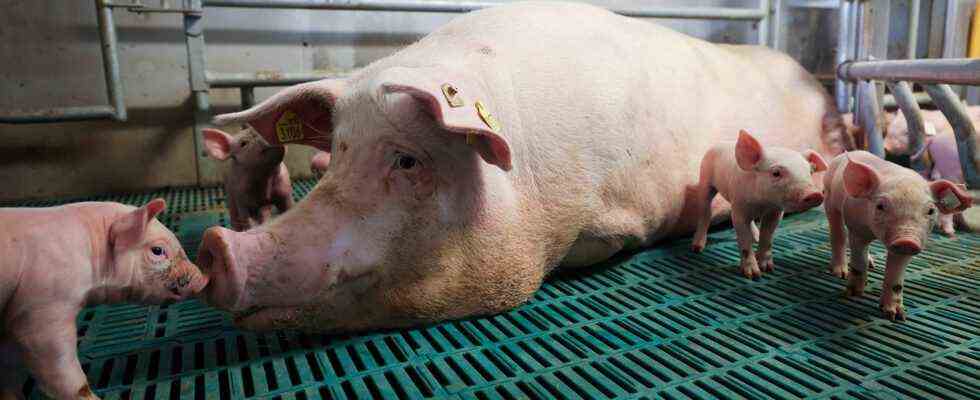Status: 13.12.2021 8:45 a.m.
The pork price is in the cellar, meat production in the criticism. Many farmers are considering giving up their business. There are calls for exit bonuses – but their benefits may be limited.
Rosy little piglets suckle on the teats of the mother sow. Farmer Manfred Aue takes one in his hand, checks whether it is healthy, strokes it and carefully puts it back to the mother sow. His business in Fürstenzell near Passau with a total of 3,000 fattening sows, piglets and breeding sows is a model business, one of the most modern of its kind in Bavaria. Nevertheless, the 48-year-old farmer makes a minus every day. He gets 30 euros for a small piglet that he sells to a fattener. But he would need 50 euros to cover his costs. With 10,000 piglets per year, that makes a minus of 200,000 euros per year.
Future bonus instead of exit bonus
In view of this catastrophic situation, the Westfälisch-Lippische Landwirtschaftsverband and the Landvolk Niedersachsen demanded state aid in October 2021 for companies that are giving up this branch of business. Such premiums are available in the Netherlands for areas where the environment is polluted by excessive livestock. The pig farmers there receive 300 euros per fattening pig and 3000 euros per breeding sow that disappears.
The Lower Bavarian farmer Aue wants nothing to do with such an exit bonus. He demands that the money for a possible exit bonus should rather go to farmers who want to continue and invest as a future bonus. He believes that subsidies should be given for conversions to improve animal welfare, for example.
He already has plans for the barn conversion in his computer, but whether he can implement them is questionable in view of the financial situation. Due to the new animal welfare and livestock husbandry ordinance, he would have to invest 2.5 million euros in redesigning the breeding sow area alone. Aue does not want to leave such a mountain of debt to his three daughters.
Deadweight effects, but no market relief
According to a survey by the Interest Group of Pig Keepers in Germany (ISN) among over 1000 pig keepers in Germany, 60 percent of sow farmers and 40 percent of pig fatteners want to get out of production in the next ten years. Main reasons: the sum of the requirements, the lack of support in society, the lack of prospects.
For those who want to quit, an exit bonus would come in handy. But that would have deadweight effects and would do nothing for the pig prices, says Norbert Schneider, who is responsible for the economics of pig production at the State Institute for Agriculture. He is convinced that the amount of piglets and pigs that would be produced less would quickly be offset by imports.
Exit bonuses in the past have no effect
This has already been shown in the past. In the 1970s, for example, there was a slaughter premium for dairy cattle to reduce the so-called butter mountain. At that time there was 732 Deutsche Mark per cow, for a maximum of ten cows per farm. At that time, this premium was also mainly used by farmers who would have stopped anyway. The continuous increase in the milk yield of the cows quickly made up for the lower number of animals.
A study by the University of Kiel has shown that 60 percent of pig farmers can imagine a paid exit from pig farming. The willingness to withdraw depends, however, on how high the compensation payments would be and whether the closed stalls would have to be demolished.
Sales problems on the world market
Piglet and pork prices have been in the basement for more than a year, partly because of the African swine fever and the resulting export restrictions for German pork. At the same time, China, previously an importing country, has expanded its own production. Countries like Denmark or Spain no longer deliver to China, but increasingly to Germany.
The global competition is causing problems for German pig farmers. For farmer Aue, it is a problem that, as a comparatively small piglet producer, he has to compete on the world market, but less high standards apply in other countries – for example in terms of taxes, requirements, occupational health and safety or animal welfare. The number of pig farmers in Germany has been falling for five years.
Five times in Germany at discounters
Aldi, the Rewe Group and Kaufland have announced that they will consistently switch to the “5xD” principle for fresh pork from 2022; That means: Birth, rearing, fattening, slaughtering and processing must take place in Germany. That sounds good at first and is a signal for German piglet producers and pig fatteners. However, fresh meat makes up less than a third of the meat sold. Two thirds are in sausage and processed goods – and in future it will not be labeled where the meat comes from.
Only the discounter Lidl is making an exception: from the beginning of 2022, “5xD” will apply to both fresh meat and processed goods. According to the interest group of pig farmers in Germany, the remaining grocers would have to follow suit, and the processed goods would have to follow suit quickly.

